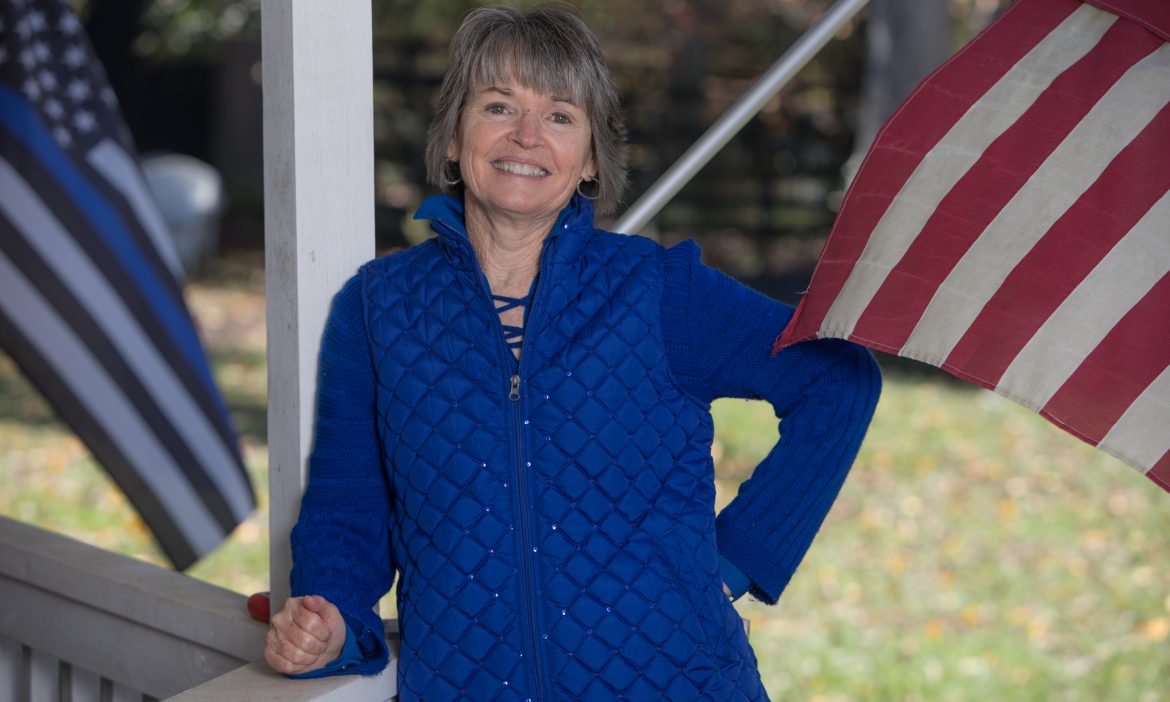
Connie Gautreaux may have enlisted in the United States Air Force at 17, spending 20 years in the service before retiring, but she’s always preferred to keep her boots on the ground. When you have a lifelong passion for investigation, you have to be in the field, doing the work and leaving no stone unturned.
Growing up in Emporia, Va. as part of a military family — her father served in WWII and was part the D-Day invasion’s first wave — Connie spent a lot of time with her aunt and uncle, Emporia’s chief of police.
“My uncle is my hero, and the reason I love investigation,” says Connie, a senior investigator with the BlueCross Special Investigations Unit. “I was able to watch him work, see his thought process and how he treated people. Though I never wanted to be a street cop, I always wanted to know about every investigation.”
Learning to fly
Connie joined the Air Force in 1974, but admits she wasn’t yet thinking about a career rooted in investigation. Like most 17-year-olds, she was looking for travel and adventure.
“I told the recruiter I wanted to be a flight attendant — that’s how much I knew about the Air Force,” Connie recalls with a laugh. “And he said, ‘Oh, we can hook you right up. That’s exactly what you’re going to do.’”

That prediction proved inaccurate. While the travel was immediate — she was stationed in Okinawa, Japan — the adventure manifested as an unexpected opportunity. She became the first female crew chief on the C-130 aircraft, the beginning of a career marked by milestones.
“I was an experiment to see if a woman could do the job,” Connie says. “To be a crew chief on military aircraft, you must have excellent scores. I did, but I didn’t know the difference between a screwdriver and a pair of pliers. But I was determined, as I thought I was being set up for failure.”
Connie more than met the challenge — she excelled. She credits her success to her crew, all of whom were airmen who shared her commitment to excellence.
“Everything was physically challenging,” Connie recalls. “To open an engine on a 130, you have to climb a ladder, get on top of the engine, and push these cam locks down with all your strength. I was 17 years old and 90 pounds, so that was difficult for me. Every airman on the flight line was always there to give me a hand, just as they did every other person. It wasn’t just me.”
“But we won every award, we had the best and cleanest aircraft, and everybody wanted to fly on it. So, I did not fail.”
A passion becomes a career
That success led to the next phase of her service, and what Connie describes as “a dream come true” for her investigative itch: joining the Air Force Office of Special Investigations (OSI).
“I had been in about eight years and was still stationed in Okinawa when I was recruited,” Connie recalls. “I returned to the U.S. and went straight to Washington. At that time, our Academy for Air Force OSI was at Bolling Air Force Base. I trained at the academy for six months to learn everything about being an investigator.”

After graduating to agent with the OSI, Connie was stationed in Tampa, Fla. There she tackled criminal cases involving active duty Air Force service members. It was difficult work that involved investigating homicides, observing autopsies, interviewing grieving family members, and more.
Connie often found herself working with local law enforcement — a twist her police chief uncle loved hearing about whenever they’d talk shop. It was one such case that, as she prepared to retire from the Air Force, led to her next career move.
Tennessee becomes home
“I knew I was only going to do 20 years in the service so that I could be young enough for another career,” Connie says. “While stationed in Tampa, one day a Tennessee Bureau of Investigation [TBI] agent called and requested assistance on a homicide case involving an airman. I worked the case, and they said, ‘Come to Tennessee and we’ll hire you.’
“I was 36 when I retired and came straight to the TBI.”

In 1998, adding another career milestone, Connie became the first female field agent in Montgomery and Stewart Counties in the TBI’s history, before advancing to Special Agent in Charge of Criminal Investigations for Middle Tennessee. Years later, an opportunity for her husband Julio — a police officer whom she met when they were classmates at the FBI National Academy — resulted in a move to the Dominican Republic, and a second retirement.
“One morning in 2011, my husband says, ‘I’ve been offered a contract in the Dominican Republic to reform the police, will you go?’” Connie recalls. “It was early in the morning, I hadn’t had any coffee, and I said, ‘Okay.’ I went from having a phone ringing 24/7, supervising 22 TBI agents, work work work, to being in the jungle, dead quiet, asking myself, ‘What just happened?’”
In that time, a restless Connie “read 1,000 books from Amazon” before going to a local university law school and asking if they needed someone to teach Criminal Justice classes. (They did.) After Julio’s contract ended, they returned to Nashville.
An evolving career journey
Not surprisingly, Connie’s retirement didn’t last the second time, either. In 2016, she joined the Special Investigations Unit (SIU) at BlueCross.

The SIU works to detect and prosecute health care fraud and abuse. Our team of investigators has more than 200 years’ combined experience in both law enforcement and audit, and manages nearly 300 active cases. These cases involve intentional deception or misrepresentation perpetrated by those seeking unauthorized benefit or payment, as well as actions inconsistent with sound business or medical practices that result in unnecessary costs.
The SIU also collaborates closely with the Provider Audit and Facility Audit areas in reviewing records and claims. When fraud is believed to possibly exist, the case is referred to the appropriate law enforcement or regulatory agency. Ultimately, these investigations seek to recover the financial loss on behalf of our members.
When Connie came on board, she had no health care investigation experience. Despite her accomplishments, and many times proving herself in the face of adversity, she doubted herself.
“With health care and health insurance, the volume of what you have to learn is huge,” she says. “I could not have survived without wonderful people sharing their knowledge with me inside and outside of BlueCross.”
Connie admits the work of the SIU required a shift in her thinking of what results look like.
“Sometimes the SIU remains behind the scenes, especially if we want federal law enforcement’s help and prosecution,” she says. “With the OSI and TBI, I was used to getting cases prosecuted.”
“Now I’m committed to supporting members who have been victimized by schemes perpetuated by bad actors, and by extension all of our members by reducing their cost of care.”
One such case, dubbed Operation: Health Right, began in 2016. A BlueCross member received an unsolicited prescription pain-relief cream in the mail. The member contacted our fraud hotline, complaining of receiving a pain cream prescription from a provider she didn’t know. Her complaint was passed to the SIU, and Connie was on the ground immediately after the lead’s legitimacy was established.
“These creams were what you’d find over the counter for $5, but the scheme involved calling people to obtain their health insurance information, sending them tubes and then billing their insurers for their continued use at exorbitant rates,” Connie says. “During our interview with the provider, he revealed he worked for a telemarketing company and had approved thousands of these prescriptions for a fee.”

Working the phones
Though her role and approach to investigating required adjusting due to COVID-19, working from home hasn’t kept her from finding ways to chase down every lead.
“I miss being in the field, but overall it’s been a fluid transition,” Connie says. “We still request and review medical records. We talk to members and providers’ offices on the phone daily. Investigators and analysts are in constant communication.”
Connie begins those conversations early, as her workday starts at 5:30 a.m., a byproduct of long commutes to Nashville. She no longer makes that drive — she and Julio moved to a farm in Clarksville, where she teleworks and he is a deputy in neighboring Cheatham County.
With two retirements already under her belt, Connie makes it clear she’s not even thinking about a third. There are always new cases, and like her uncle in Emporia, she has to see them through to their end.
“I’m too much of a rule follower who thrives on routine and loves investigations,” she says. “Part of that is lessons I learned in the military — discipline and dedication. Discipline to stay on top of my work, discipline to start work on time, discipline to document investigations truthfully. Dedication to my employer and team, and dedication to physical fitness. I have continued working out daily since my retirement — both of them!”
“So, I don’t know when I’ll retire. Not until BlueCross says, ‘You need to give us our computer and go home.’”


 Jesse joined the BlueCross BlueShield of Tennessee corporate communications team in 2017. A Chattanooga native, he has more than 15 years’ experience in content creation, management, and strategy for consumer audiences, including a six-year stint in health care marketing.
Jesse joined the BlueCross BlueShield of Tennessee corporate communications team in 2017. A Chattanooga native, he has more than 15 years’ experience in content creation, management, and strategy for consumer audiences, including a six-year stint in health care marketing.